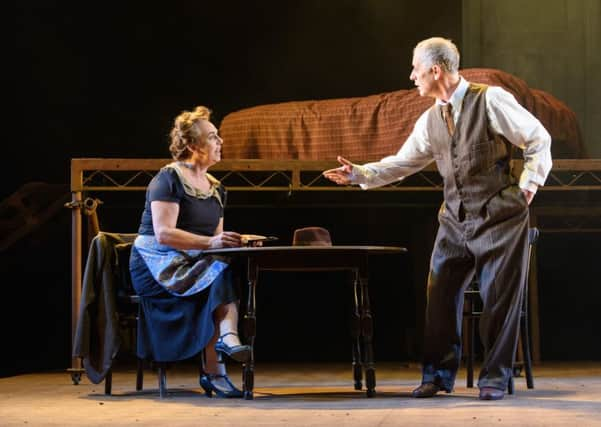Theatre review: Death of a Salesman


Death of a Salesman *****
Dundee Rep
For as Billy Mack makes clear, in his brilliant and heartbreaking central performance, the tragedy of Miller’s hero Willy Loman is that he believes in the American Dream of success through hard work, enterprise and charm, and in all the ideas about masculinity and fatherhood that come with it. Despite his relatively humble job as a travelling salesman, he projects himself to his two sons, Biff and Happy, as the very embodiment of that dream, a successful, well-liked man providing generously for his family, and preparing his sons for an even more glorious future.
The problem is, though, that much of this is a kind of personal ‘fake news’, a series of hopeful lies or half-truths told in the face of a much more brutal economic reality.
Advertisement
Hide AdIn Neil Warmington’s powerful design, the central area occupied by Willy’s house in Brooklyn is surrounded by something like a Hooverville, one of the brazier-lit encampments of homeless people that grew up in America in the hungry 1930’s; and from there – in the mournful flute-tunes, songs, murmurings, and low boken-piano twangs of Nikola Kodjabashia’s live score – come intimations of a much darker and more fearful world.
It’s therefore a perfect setting for the story of 63-year-old Willy’s final collapse – after his regular salary then his job is taken away – into an agonising confrontation with the adored eldest son who has been so damaged by his fantasies, and a fatal conviction that, with his insurance fully paid, he is worth more dead than alive. Irene Macdougall is heart-rending as his steadfastly loving wife Linda, Ewan Donald outstanding as his broken son Biff. And the whole play stands as vital testimony to the truth that a brutally competitive society produces desperate losers, as well as winners; a fact about which that society has to lie constantly and ever more dangerously, in order to disguise its own everyday cruelty, and the absolute human value of those it casts onto the scrapheap, without decency or compunction.
*Until 11 March